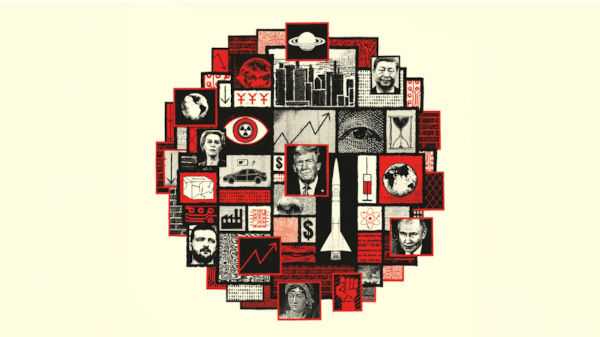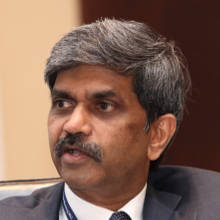The World Ahead 2025

[Cover Image:The Economist: The World Ahead 2025]
Insights from The Economist’s report ‘The World Ahead 2025’
D ShivakumarThe repercussions of Donald Trump’s sweeping victory will affect everything from immigration to defence to economics and trade
America’s more transactional stance and scepticism of foreign entanglements will encourage troublemaking by China, Russia, Iran and North Korea.
Western economies have to cut deficits by increasing taxes, cutting spending or boosting growth.
More than $1 trillion is being spent on data centres for AI.
Trump’s early appointments suggest an emphasis on loyalty, hawkishness, and disruption.
Ukraine’s future depends on whether Europe can defend it. China and others will take note. American promises as ally will be read as empty.
Extending America’s lead in AI would do more to ensure its future prosperity and military security.
The security of Europe is entering a perilous and enduring decline. Europe’s leaders are weak and distracted by problems at home.
Instead of standing up, they are burying their heads deeper in the sand.
It is hard to say which is in shorter supply in Europe — money or leadership.
For Vladimir Putin, Europe’s division is an end in itself; for Trump it is a means to make Europe weak and undermine Europe’s leverage in negotiations.
America’s share of global GDP is 26%, the same it was in 1987.
The Peterson institute reckons a 10% universal tariff on imports and a retaliation by trade partners would take off 1% of Americas GDP Growth of 2 to 3%.
Tariffs will harm growth and push up prices.
In 2024, voters everywhere were fed up. Two things stood out everywhere — high prices or inflation and second was immigration.
For rich countries striking a balance is important in dealing with immigration.
Most companies are not sure what AI can or cannot do. Only 5% of American businesses say they are using AI in their products and services.
Open AI says 75% of its revenue comes from consumer use cases rather than corporate use cases.
The average age of world’s political leaders has increased from 55 to 62 in the past five decades.
France allows 18-year-olds to run for president.
Italy’s president must be at least 50, but no country sets an upper age limit for politicians.
Everest climbing season starts in March. In 2025, drones will be used for the first time to carry supplies up and rubbish down the mountain. This was tested in 2024.
Ryanair plans to scrap all paper boarding passes by May 2025, in favour of all digital travel documents and processes.
The Indian government plans to devote $130 billion to capital expenditure to the end of March 2025, a 230% increase in the last five years. The benefits are visible in new airports, highways and railway stations.
S&P Global reckons that Indian conglomerates will invest $800 billion in the next ten years, almost three times of what they did the last decade. 40% of this will be in emerging industries like green hydrogen, chipmaking, data centres, and EVs.
In July 2025, Narendra Modi’s term will exceed every other prime minister’s except Nehru’s. If Modi has to catch up with Nehru, he has to create better paying jobs for the voters.
Mumbai’s infrastructure, which is an embarrassment, will get new metro lines in 2025 and a new airport. The coastal road will be completed in 2025.
India’s urban centres have endured years of neglect as cities expanded in size and population.
A high-speed train link to Ahmedabad and a motorway to Delhi are next.
China moves mountains to get 5% growth, while Indonesia has been doing that easily for three decades. For a middle-income country this is mediocre.
Indonesia’s fiscal restraint rules cap debt and deficits at 60% and 3% of GDP respectively.
Achieving 8% growth will require deeper changes.
The Chinese see Trump as intellectually uncurious and self-interested. His election is seen as further evidence of America’s decadence and decline.
China can ill afford a trade war of any size. Chinese economy has underperformed since the pandemic.
China’s rulers keep disappointing investors with timid and incomplete policies.
First tier cities are losing their lustre in China. Many second-tier cities are getting attractive for work.
China dominates EVs, solar panels, and batteries globally.
Most countries globally are small, and their security depends on the bigger countries following rules and order.
The vast majority of people Trump wants to deport are Latin Americans. Of the 11 mln, 4 mln are Mexican, 2 mln are from Central America, 800,000 from South America, and 400,000 from the Caribbean.
If they are deported, these economies will take a big hit since remittances will stop.
“Soldiers fight wars, politicians decide when we’ve won” - Israeli General
Microsoft and Abu Dhabi are investing in AI infrastructure. Brad Smith of Microsoft calls this a ‘new model’ where it is a government to government relationship supported by the private sector.
Saudi Arabia and Google are setting up a $40 bln AI fund.
The Middle East countries recognise that they need Western technology but need Chinese efficiency, manufacturing, construction, and engineering help.
According to IMF, 9 of the top 20 GDP growth countries in 2025 will be African nations.
On average resource rich countries have lower GDP per person today than in the past in Africa because of lower export prices.
Representatives of every creative industry have filed copyright infringement complaints against generative AI companies for using their material without permission or payment to test their AI models.
In Russia, the Ukraine war is hurting them. In early November 2024, inflation was in double digit, interest rates were 21% and 40% of the budget was taken up by the military and security spending.
The days of 2% of GDP investment in defence are behind us; most countries are going to 3% and some to 5%.
Electric vehicles are a bright spot, but range anxiety persists and pushes consumers towards plug-less models.
Cash is no longer king. The world will have 2 billion credit cards but only 3 million ATMs in 2025.
$195 trillion is the total assets held by banks. 50% is held by the G7 countries.
Consumers will spend $11.5 trillion on food globally, up 6% vs 2024.
IT spending will be $3.6 trillion globally.
Around 30% of US companies will invest $10 million or more in AI.
Copper prices will go up 12%, aluminium by 10%, gold by 5.5 %, lead by 4% in 2025.
83.1% of 100 people globally will use the internet in 2025 vs 57% pre pandemic.
Sports channels and cable TV will be challenged. Amazon has the rights for NBA from 2025 and Netflix has WWF.
Clothing sales globally will be $1.03 trillion.
EV cars from China—some innovations
India overtakes Japan as the 4th largest economy.
Micro drama or one-minute dramas are the big craze in China today on mobile phones. They are a cross between TikTok and Netflix.
Was this article useful? Sign up for our daily newsletter below
About the author

Shivakumar is Operating Partner at Advent International. Before this, he was President (Corporate Strategy and Business Development) at Aditya Birla Group. Earlier assignments include: Chairman & CEO at Pepsico India and prior to that, Managing Director at Nokia India. Before joining Nokia, he worked with consumer electronics maker Philips and top consumer goods firm Hindustan Unilever. He is an engineer from IIT Chennai and an MBA from IIM Calcutta.
Shivakumar has written three books: Reflections - a collection of Shivs articles; The Right Choice - Resolving Ten Career Dilemmas; and The Art of Management. The latter two are business bestsellers.
Also by me
Trending